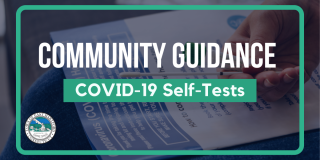Community Guidance for COVID-19 Self-Tests

Testing is critically important to help reduce the spread of the virus that causes COVID-19. Self-testing is also useful for screening for COVID-19 immediately before an activity to see if you are positive for COVID-19. Self-testing offers fast results and is one of several options for testing currently available. However, testing is only one of many risk-reduction measures. Vaccination, masking, and social distancing are also essential risk-reduction actions people should take to stop the spread of COVID-19.
COVID-19 Self-Test Frequently Asked Questions
Why Use a COVID-19 Self-Test?
COVID-19 self-tests are one of many actions you can take to protect yourself and your close contacts. To protect yourself and others against COVID-19, you should:
- Get the COVID19 vaccine and your booster
- Wear a mask
- Practice social distancing, whenever possible
Are COVID-19 self-tests difficult to use?
Self-tests can be taken at home or anywhere, are easy to use, and produce results within minutes.
How do I use the self-test?
Please follow the iHealth instructions for performing the test. They are also enclosed in the test kit. Additional languages are available online.
For more information on the use of the iHealth COVID-19 self-test, please visit the iHealth website and review the instructional video.
Each kit has two test cards. Can I use one of them for two people?
Each kit is meant for one person. If your first test is negative, use the second test 24 - 48 hours later, per manufacturer’s instructions.
When should I use it?
- Around the holidays - don’t spread COVID-19!
- Use a self-test before going to indoor gatherings with people who are not in your household, in order to make sure you are not spreading infection.
- Use a self-test if you are feeling sick to quickly learn if you might have COVID-19.
If I am vaccinated or unvaccinated, will the test still work?
Yes. You can use self-tests, regardless of vaccination status.
How long do I need to be sick before I use the test kit?
You can use self-tests, even when you are not sick. Consider using these self-tests before joining indoor gatherings or activities with others who are not your close contacts.
I feel fine, but I am going to a party on New Year’s Eve. Should I use it?
Yes. Before joining others at an indoor party, use the test to make sure you aren’t infecting others.
What does a positive COVID-19 self-test result mean?
If you test positive, you should isolate and inform your healthcare provider, as well as any close contacts. You do not need to get another test through a doctor or pharmacy.
- A positive self-test result means that the test detected the virus, and you are very likely to have COVID-19.
- Stay home or isolate for five days, even if you are asymptomatic or your symptoms are resolving.
- Wear a mask if you have contact with others.
- Avoid indoor gatherings to reduce the risk of spreading disease to someone else.
For additional guidance on updated COVID-19 quarantine and isolation recommendations, please click here.
What does a negative COVID-19 self-test mean?
A negative self-test result means that the test did not detect the virus and you may not have an infection, but it does not entirely rule out infection. Repeating the test within a few days, with at least 24 hours between tests, will increase the confidence that you are not infected. (That is why each kit comes with two tests.)
What does an inconclusive or invalid COVID-19 self-test mean?
If your home test is inconclusive, use the second test card and try again. If both are inconclusive, then consider getting tested through your health care provider, a pharmacy, or at a community site.
Do I need to report my COVID-19 test result to the state or local health authorities?
No. You do not need to report your result to public health authorities, but you should tell your close contacts (people you have spent time with lately) that you have COVID-19, so that they can get tested and protect others, too. In addition, if a child who attends daycare or school tests positive, you should inform the institution.
Will this test detect variants?
The self-test kits are able to identify COVID-19 variants.
How accurate are the COVID-19 self-tests?
Based on the results of a clinical study where the iHealth® COVID-19 Antigen Rapid Test was compared to an FDA authorized molecular SARS-CoV-2 test, iHealth® COVID-19 Antigen Rapid Test correctly identified 94.3% of positive specimens and 98.1% of negative specimens.
For more information on self-test kits, please visit the CDC website at Self-Testing | CDC

